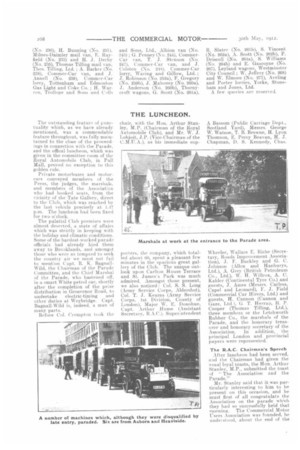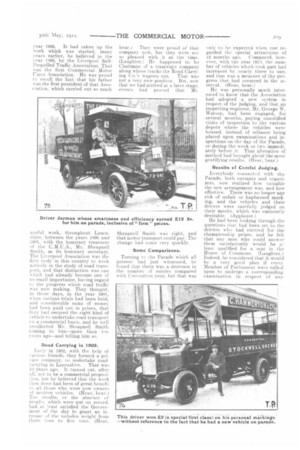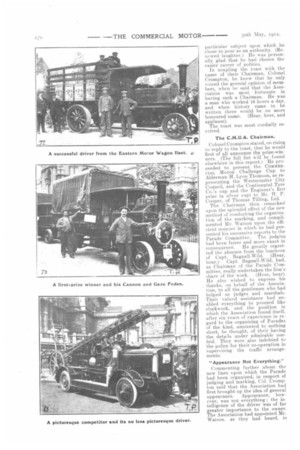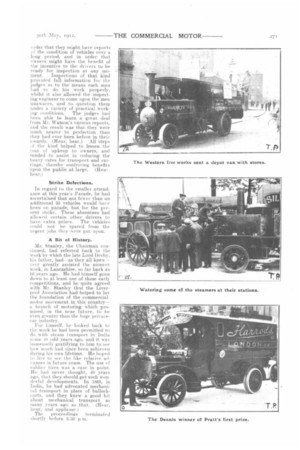THE LUNCHEON.
Page 16

Page 17

Page 18

Page 19

If you've noticed an error in this article please click here to report it so we can fix it.
The outstanding feature of punctuality which, as we have already mentioned, was a commendable feature throughout, was fully maintained to the close of the proceedings in connection with the Parade, and the offical luncheon, which was given in the committee room of the Royal Automobile Club, in Pali Mall, proved no exception to this golden rule.
Private motorbuses and motorcars conveyed members of the Press, the judges, the marshals, and members of the Association who had booked seats, from the vicinity of the Tate Gallery, direct to the Club, which was reached by the last vehicle precisely at 1.17 p.m. The luncheon had been fixed for two o'clock.
The palatial Club premises were almost deserted, a state of affairs which was strictly in keeping with the holiday and climatic conditions. Some of the hardest-worked parade officials had already hied them away to Broaklands, and amongst those who were so tempted to seek the country air we must not fail to mention Capt. R. K. BagnallWild, the Chairman of the Parade Committee, and the Chief Marshal of the Parade, who hastened off, in a smart White petrol car, shortly after the completion of the prize distribution in Grosvenor Road, to
undertake electric-timing other duties at Weybridge. apt: Bagnall-Wild is, indeed, a man ot many parts.
Before Col. Crompton took the chair, with the Hon. Arthur Stanley, M.P. (Chairman of the Royal Automobile Club), and Mr. W. J. Lobjoit, J.P. (Vice-Chairman of the C.M.U.A.), as his immediate sup
porters, the company, which totalled about 60, spent a pleasant few minutes in the spacious great gallery of the Club. The unique outlook upon Carlton House Terrace and St. James's Park was much admired. Amongst those present, we also noticed: Col. S. S. Long (Army Service Corps, Aldershot), Col. T. J. Kearns (Army Service Corps, 1st Division, County of London), Major W. E. Donohue, (_'a.pt. Arthur Hume (Assistant Secretary, R.A..C.), Super;ntendent A Bassom (Public Carriage Dept., Scotland Yard), Messrs. George W. Watson, T. B. Browne, H. Lyon Thomson, E. Percy Beavan, H. J. Chapman, I). S. Kennedy, ChM.
Wheeler, Wallace E. Riche (Secretary, Roads Improvement Association), J. F. Buckley and G. C. Johnson (Allen and Hanburys, Ltd.), A. Grey (British Petroleum Co., Ltd.), W. H. Willcox, A. C. Kidder (Continental Tyre Co.) and guests, J. Ames (Messrs. Carless, Capel and Leonard), F. J. Field (Commercial Car Hirers, Ltd.) and guests, H. Cannon (Cannon and Gaze, Ltd.), G. T, Harrap, It. P. Cooper (Thomas Tilling, Ltd.), three members or the Letchworth Rubber Co., the marshals of the Parade, and the honorary treasurer and honorary secretary of the Association. In addition, the principal London and provincial papers were represented.
The R.A.C. Chairman's Speech After luncheon had been served, and the Chairman had given the usual loyal toasts, the Hon. Arthur Stanley, M.P., submitted the toast of "The Association and the Parade."
Mr. Stanley said that it was particularly interesting to him to be present on this occasion, and he must first of all congratulate the Association on the parade which they had so successfully held that morning. The Commercial Motor Users Association was founded, he under stood, about the end of the year 1903. It had taken up the work which was started, many years earlier, he believed in the year 1"396, by the Liverpool SelfPropelled Traffic Association. That was the first Commercial Motor Users Association. He was proud to recall the fact that his father was the first president of that Association, which carried out so much useful work, throughout Lancashire, between the years 1896 and 1901, with the honorary treasurer of the C.M.U.A., Mr. Shrapnell Smith, as its honorary secretary. The Liverpool Association was the first body in this country to work actively in the study of road transport, and that distinction was one
hich had already become one of no small importance, having regard o the progress which road traffic was now making. They thought, in those days, in the year 1901, when various trials had been held, and considerable MUMS of money had been paid out in prizes, that they had secured the right kind of vehicle to undertake road transport en a commercial basis, and he well recollected Mr. Shrapnel' Smith coming to him—more than ten years ago—and telling him so.
Road Carrying in 1902.
Early in 1902, with the help of various friends, they formed a private company, to undertake roadcarrying in Lancashire. That was 10 years ago. It. turned out, after all, not to be a commercial propoAtion, hut he believed that the work then done had been of great benefit to all those who were now owners of modern vehicles. (Hear, hear.) The results, or the absence of results. which were put on record. had at least satisfied the Govern. ment of the day to grant an increase of the unladen weight from three i ons to five tons. (Hear.
hear.) They were proud of thai
company now, but they were not so pleased with it at the time. (Laughter.) He happened to be Chairman of a. tramways company along. whose tracks the Road Carry
ing Co.'s wagons ran. That was not a very nice position. But, now that we had arrived at, a later stage, events had proved that Mr.
Shrapnel' Smith was right, and that motor transport could pay. The change had come very quickly.
Some Comparisons.
Turning to the Parade which all present. had just witnessed, he found that there was a decrease in the number of entries compared with Coronation year. hut that was only to be expected when one regarded the special attractions of 12 months ago. Compared, however, with the year 1910, he number of vehicles which took part had increased by nearly three to one, and that was a measure of the progress that had occurred in the interval. (Hear, hear.) He was personally much interested to know that the Association had adopted a new system in respect of the judging, and that an inspecting engineer, Mr. George W. Watson, had been engaged, for several months, paying unnotified visits of inspection to the various depots where the vehicles were housed, instead of reliance being placed upon examinations and inspections on the day of the Parade, or during the week or two immediately before it. That. alteration of method had brought. about the most gratifying results. (Hear, hear.) Results of Careful Judging.
Everybody connected with the Parade, both entrants and organizers, now realized how valuable the new arrangement was, and how effective. There was no longer any risk of unfair or haphazard markMg, and the vehicles and their drivers were carefully judged on their merits. which was eminently desirable. (Applause.)
He had been looking through the questions that had been set, to the drivers who had entered for the championship prizes, and he felt that any man who could answer them satisfactorily would be at least qualified for a seat in the House of Commons. (Laughter.) Indeed, he considered that it would be a very good plan if every Member of Parliament were called upon to undergo a corresponding examination in respect of any
particular subject upon which he chose to pose as an authority. (Renewed laughter.) lie was personally glad that he had chosen the easier career of polities.
In coupling the toast with the name of their Chairman, Colonel Crompton, he knew that he only voiced the general opinion of members, when lie said that the Association was most fortunate in having such a Chairman. He was a man who worked 18 hours a day, and when history came to be written there would be no more honoured name. (Hear, hear, and applause). The toast was most cordially received.
The C.M.U.A. Chairman.
Colonel Crompton stated, on rising to reply to the toast, that he would first of all announce the prize-winners, (The full list will be found elsewhere in this report.) He proceeded to present the COMMERmu, MOTOR Challenge Cup to Alderman H. Lyon Thomson, as representing the Westminster City Council, and the Continental Tyre Co.'s cup and the Engineer's first prize (a silver cup) to Mr. H. P. Cooper, of Thomas Tilling, Ltd.
The Chairman then remarked upon the splendid effect of the new method of conducting the organization of the marking, and complimented Mr. Watson upon the efficient manaer in which he had presented his successive reports to the Parade Committee. The judging had been fairer and more exact in consequence. He greatly regretted the absence from the luncheon of Capt. Bagnall-Wild. (Hear, hear.) Capt. -Bagnall-Wild, had, as Chairman of the Parade Committee, really undertaken the lion's share of the work. (Hear, hear). He also wished to express his
. thanks, on behalf of the Association, to all the gentlemen who had helped as judges and marshals. Their valued assistance had en abled everything to proceed like clockwork, and the position in which the Association found itself, after six years of experience in regard to the organizing of Parades of the kind, amounted to nothing short., he thought, of their having the details under admirable con trol. They were also indebted to the police for their co-operation in supervising the traffic arrangements.
"Appearance Not Everything."
Commenting further about the new lines upon which the Parade had been organized, in respect of judging and marking, Col. Crompton said that the Association had first brought up the idea of general appearance. .Appearance, however, was not everything ; the intelligence of the driver was of far greater importance to the owner. The Association had appointed Mr. Watson. as they had heard, in order that they might have reports of the condition of vehicles over a long period, and in order that owners might have the benefit of the incentive to the drivers to be ready for inspection at any mo ment. Inspections of that kind provided full information for the judges as to the means each man had to do his work properly, whilst it also allowed the inspecting engineer to come upon the men unawares, and to question them under a variety of practical work ing conditions. The judges had been able to learn a great deal from Mr. Watson's various reports, and the result was that they were much nearer to perfection than they had ever been before in their awards. (Hear, hear.) All steps the kind helped to lessen the cost of upkeep to owners, and tended to assist in reducing the heavy rates for transport and carriage, thereby conferring benefits upon the public at large. (Heat , hear.) Strike Defections.
In regard to the smaller attendance at this year's Parade, he had ascertained that not fewer than an additional 35 vehicles would haN e been on parade, but for the present strike. These absentees had allowed certain other drivers to have extra prizes. The vehicles could not be spared from the urgentjobs they were put upon.
'A Bit of History.
Mr. Stanley, the Chairman continued, had referred back to the work by which the late Lord Derby, his father, had--as they all knew--very greatly assisted the pioneer work, in Lancashire, so far back as 6 years ago. He had himself gone down to at least one of those early competitions, and he quite agreed with Mr. Stanley tlett the Liverpool Association had helped to lay the foundation of the commercialmotor movement in this country— a branch of motoring which promised, in the near future, to be even greater than the huge privatecar industry.
For himself, he looked back to the work he had been permitted to do with steam transport in India some to odd years ago, and it was immensely gratifying to him to see how much had since been achieved during his own lifetime. He hoped te live to see the like relative advances in future years. The use of rubber tires was a case in point. He had never thought, 40 years ago, that they should get such wonderful developments. In 1868, in India, he had advocated mechanical transport in place of bullockcarts, and they knew a good bit about mechanical transport as many years ago as that. (Hear, hear, and applause.) The proceedings terminated shortly before 3.30 p.m.
























